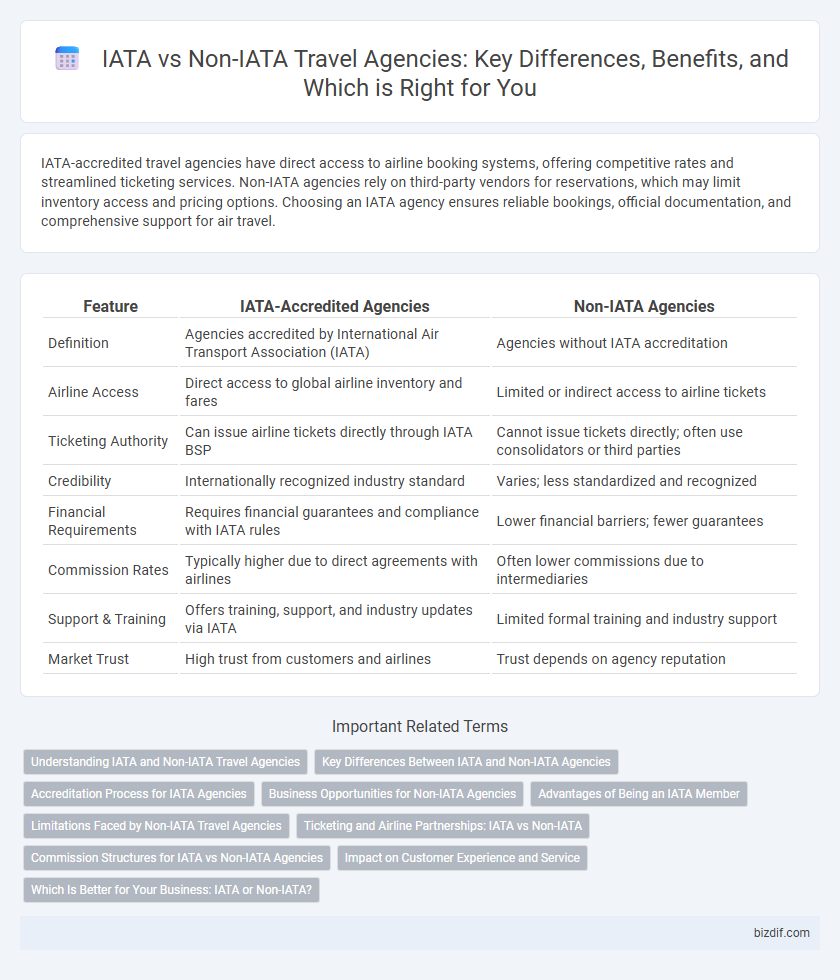IATA-accredited travel agencies have direct access to airline booking systems, offering competitive rates and streamlined ticketing services. Non-IATA agencies rely on third-party vendors for reservations, which may limit inventory access and pricing options. Choosing an IATA agency ensures reliable bookings, official documentation, and comprehensive support for air travel.
Table of Comparison
| Feature | IATA-Accredited Agencies | Non-IATA Agencies |
|---|---|---|
| Definition | Agencies accredited by International Air Transport Association (IATA) | Agencies without IATA accreditation |
| Airline Access | Direct access to global airline inventory and fares | Limited or indirect access to airline tickets |
| Ticketing Authority | Can issue airline tickets directly through IATA BSP | Cannot issue tickets directly; often use consolidators or third parties |
| Credibility | Internationally recognized industry standard | Varies; less standardized and recognized |
| Financial Requirements | Requires financial guarantees and compliance with IATA rules | Lower financial barriers; fewer guarantees |
| Commission Rates | Typically higher due to direct agreements with airlines | Often lower commissions due to intermediaries |
| Support & Training | Offers training, support, and industry updates via IATA | Limited formal training and industry support |
| Market Trust | High trust from customers and airlines | Trust depends on agency reputation |
Understanding IATA and Non-IATA Travel Agencies
IATA travel agencies are officially accredited by the International Air Transport Association, enabling them to issue airline tickets directly and access global distribution systems for seamless booking. Non-IATA agencies lack this accreditation but often partner with IATA agents or consolidators to provide travel services, usually focusing on niche markets or specialized packages. Understanding the distinction ensures travelers recognize the reliability, ticketing capabilities, and access to airline systems offered by IATA agencies compared to the broader service approach of Non-IATA agencies.
Key Differences Between IATA and Non-IATA Agencies
IATA agencies are accredited by the International Air Transport Association, allowing them access to global airline ticketing systems, exclusive airline contracts, and streamlined payment processes. Non-IATA agencies lack this accreditation, often relying on third-party consolidators or limited direct access to airline inventories, which can impact pricing and availability. The key differences include IATA's ability to issue official airline tickets and greater industry recognition compared to the restricted scope and operational limitations of non-IATA agencies.
Accreditation Process for IATA Agencies
The IATA accreditation process for travel agencies involves a thorough evaluation of business capabilities, financial stability, and compliance with airline industry standards, ensuring authorized access to airline products and ticketing systems. Non-IATA agencies operate without this certification, limiting their ability to book directly with airlines and often requiring intermediary services. Obtaining IATA accreditation enhances credibility, streamlines booking operations, and provides access to negotiated airline rates and global distribution systems (GDS).
Business Opportunities for Non-IATA Agencies
Non-IATA travel agencies can access niche markets and offer personalized travel experiences by partnering with larger IATA agencies for ticketing and international bookings. Leveraging technology and direct contracts with local suppliers enables Non-IATA agencies to reduce operational costs and enhance profit margins. Focusing on specialized services such as customized tours, corporate travel management, and destination expertise provides significant business growth opportunities beyond traditional IATA constraints.
Advantages of Being an IATA Member
IATA membership provides travel agencies with access to a global network of airlines, enabling seamless ticketing and streamlined payment solutions through the Billing and Settlement Plan (BSP). Being an IATA-accredited agency enhances credibility and trust among clients and industry partners, often resulting in increased business opportunities and exclusive offers. Additionally, IATA members benefit from specialized training, industry updates, and support services that improve operational efficiency and competitive advantage.
Limitations Faced by Non-IATA Travel Agencies
Non-IATA travel agencies face significant limitations, including restricted access to airline reservation systems and lack of direct ticketing capabilities, which can delay booking processes and reduce competitive pricing options. These agencies often rely on intermediaries for issuing tickets, increasing costs and limiting flexibility in managing traveler itineraries. Non-IATA agencies also encounter difficulties establishing direct partnerships with airlines, hindering access to exclusive deals, promotions, and industry discounts available only to IATA-accredited agents.
Ticketing and Airline Partnerships: IATA vs Non-IATA
IATA-accredited travel agencies gain direct access to global airline ticketing systems and benefit from established airline partnerships, ensuring efficient ticket issuance and better fare options. Non-IATA agencies often rely on intermediaries or consolidators for ticketing, which may limit access to some airline inventories and reduce pricing flexibility. Airline partnerships through IATA accreditation also facilitate streamlined settlements and enhanced support, improving overall service quality for travelers.
Commission Structures for IATA vs Non-IATA Agencies
IATA agencies benefit from negotiated commission structures directly linked to airline partnerships, typically earning higher base commissions and access to exclusive incentives, while non-IATA agencies often face reduced commission rates and limited fare options due to lack of direct accreditation. The commission framework for IATA agencies includes benefits such as override commissions and marketing support, enhancing profitability. Non-IATA agencies rely more heavily on third-party consolidators or aggregators, which impacts their earning potential and flexibility in pricing strategies.
Impact on Customer Experience and Service
IATA-certified travel agencies offer customers access to standardized global airline inventories, streamlined ticketing processes, and enhanced security measures, resulting in a smoother booking experience. Non-IATA agencies may lack direct airline accreditation, potentially leading to limited flight options and less competitive pricing, which can affect customer satisfaction. The distinction influences overall service reliability, payment security, and after-sales support, directly impacting traveler trust and convenience.
Which Is Better for Your Business: IATA or Non-IATA?
IATA accreditation offers travel agencies access to global airline networks, streamlined ticketing, and industry-recognized credibility, which can boost client confidence and expand business opportunities. Non-IATA agencies may benefit from lower operational costs and greater flexibility but face limitations in airline partnerships and ticket issuance. Choosing between IATA and Non-IATA depends on your business model, growth goals, and the level of access required to airline inventory and industry resources.
IATA vs Non-IATA Infographic

 bizdif.com
bizdif.com